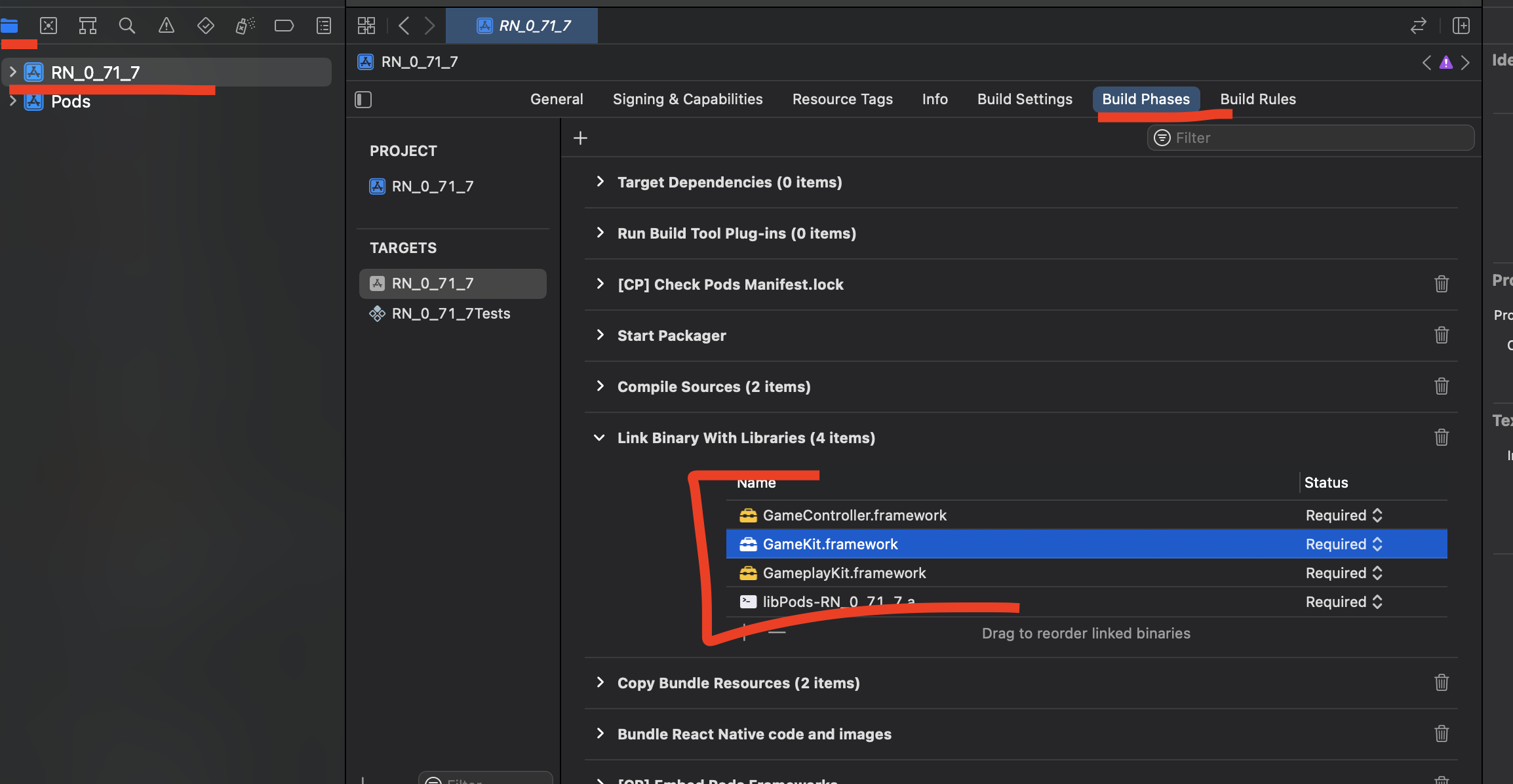- Updated setKeyboardFocus to remove limitations. The
setKeyboardFocusmethod can now be used with any focusable element viaref. - Update and refactor example project with usage of
ReactNative 0.80.x
- Update and refactor the
react-native-external-keyboardpackage. - Update and refactor the
react-native-a11y-orderpackage. - Reuse and align functionality from
react-native-external-keyboardandreact-native-a11y-order
Unfortunately, the library is outdated and uses deprecated APIs. It requires a lot of work to be done.
In spite of that, there are separate repositories you can use to achieve similar functionality:
- react-native-a11y-order - for screen reader order control
- react-native-external-keyboard - for using and implementing keyboard features
- react-native-is-keyboard-connected - for listening to keyboard connection
-
react-native-a11y-container - represents
UIAccessibilityContainer
- 🤖 Reader features: Focus, Order, Reader
- ⌨️ Keyboard features: Focus
- 🙌 Others features soon
- ⚡️ The New Arch support
| iOS reader | Android reader |
|---|---|
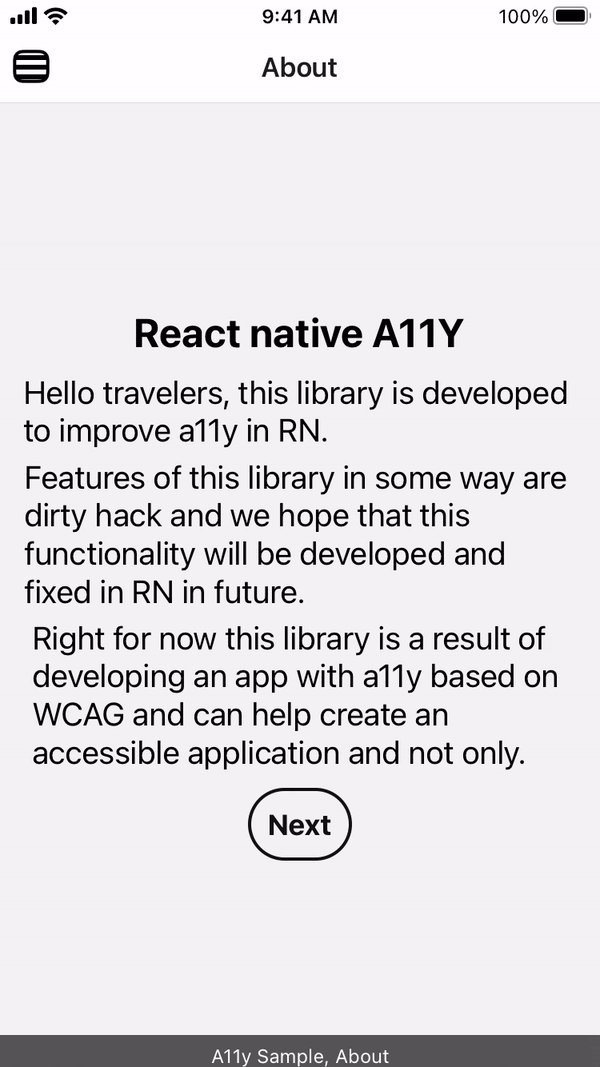 |
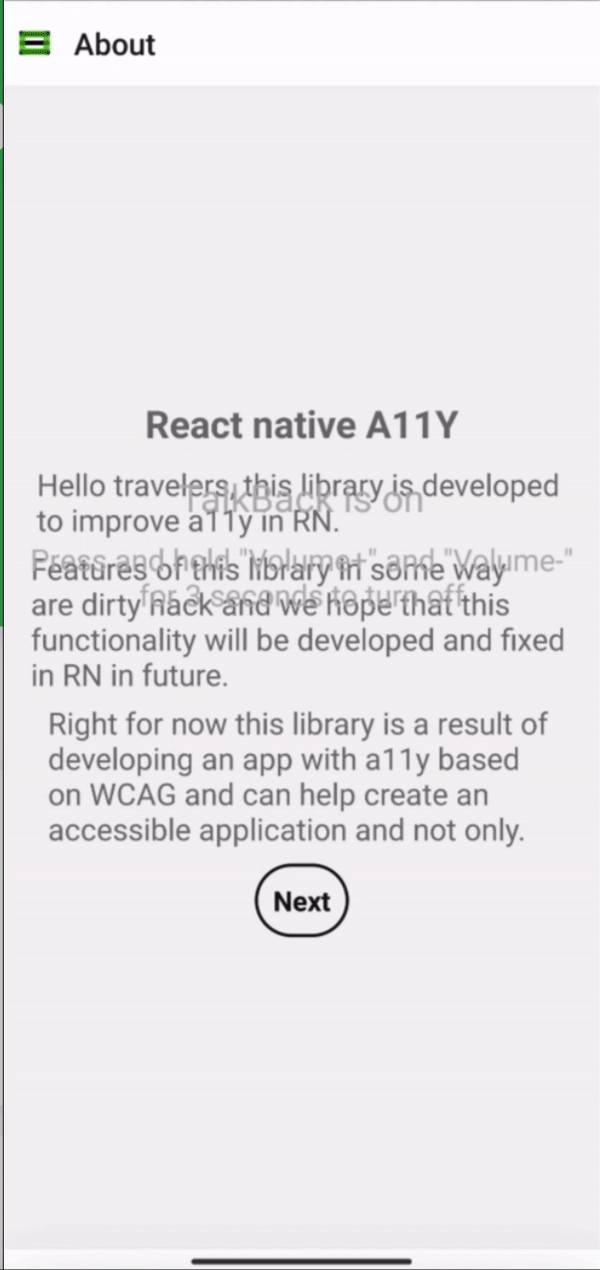 |
| iOS Keyboard | Android Keyboard |
|---|---|
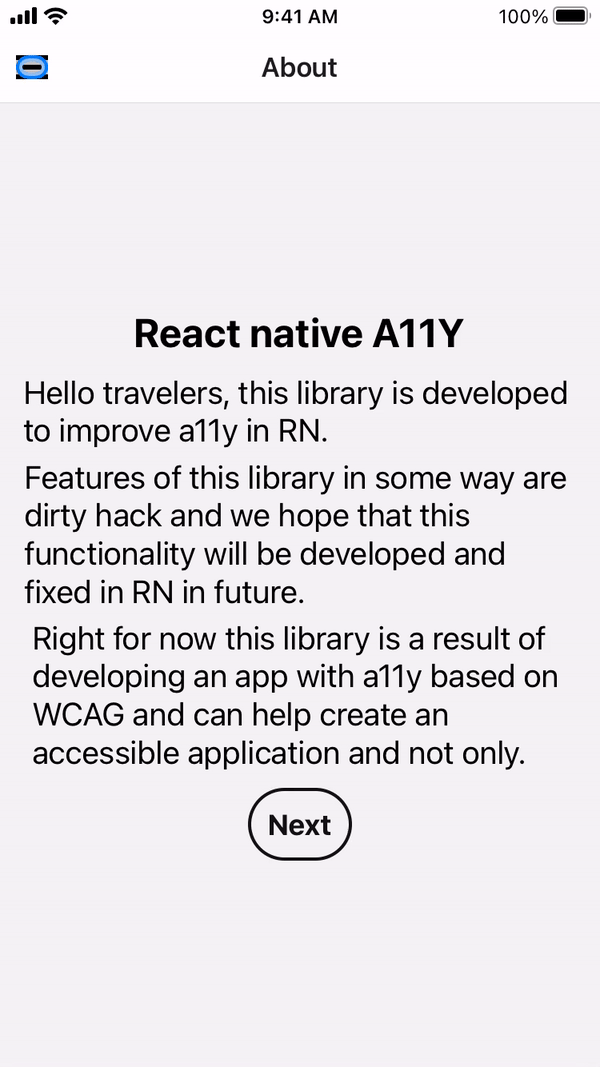 |
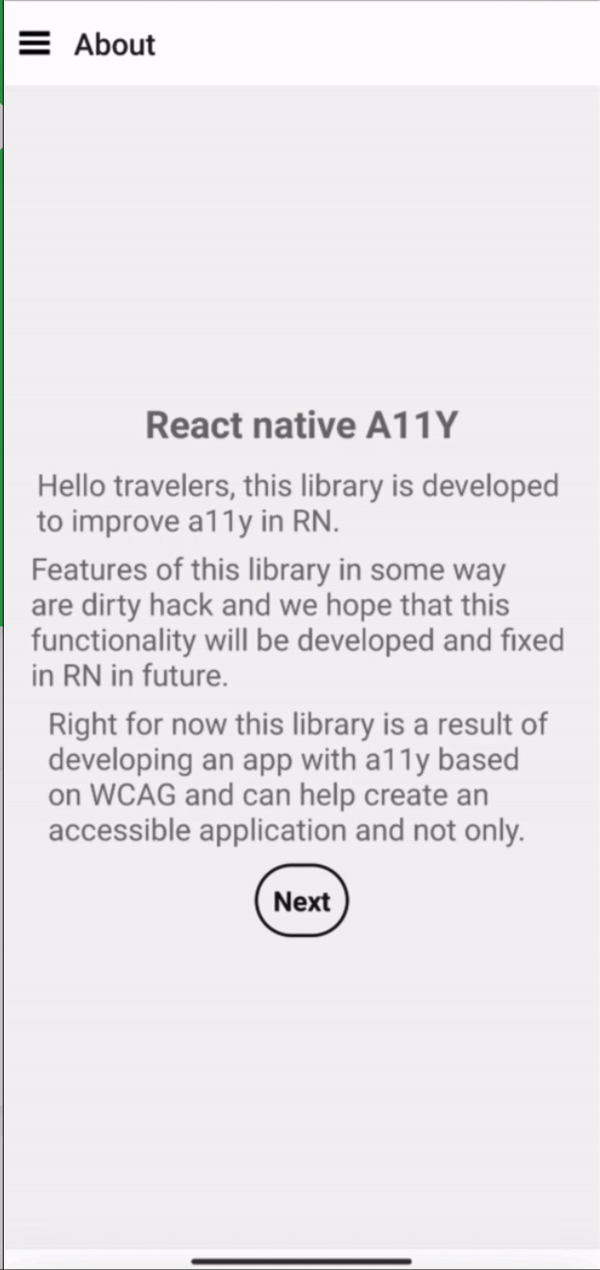 |
A11y is important, there are a lot of reasons to support and be compliant with it. First of all, it helps people with disabilities work and use your application easily and live a better life. Banks, medication, shops, and delivery is a small list of what people are usually interested in, and it can be more important for people with limitations.
There are can be other reasons, customer requirements, laws and requirements for specific groups of apps, remote control, etc. Based on this you can find a lot of advantages and benefits to supporting A11y.
This library is not finished yer and currently on beta stage. We will be glad to issues, questions, and help.
- Download package with npm or yarn
npm i react-native-a11y
yarn add react-native-a11y
-
Install pods cd ios && pod install
-
iOS only
NOTE: If you don't plan to use the isKeyboardConnected or keyboardStatusListener functionality, you can skip this step. Linking the GameController framework is optional but required for the proper functioning of isKeyboardConnected and keyboardStatusListener.
Link keyboard(Game) binary with libraries
- Open xcode
- Select folder in the project bar
- Select target project
- Select
Build Phases - Expand
Link Binary With Libraries - Press plus icon
- You can search for
Game - Select
GameController.framework
Why linking is needed
Unfortunately, the GameController framework is the only viable solution to obtain information about the keyboard and its connection. While there are other potential solutions, they are mostly workarounds and could be rejected by the App Store review process.
- Add provider to root of your app:
watch: examples/A11ySample/App.tsx
export const App = () => {
return (
<A11yProvider>
// content here
</A11yProvider>
);
};
A11y library consists of different components and hooks, to start work with react-native-a11y you can get familiar with an example app in examples/A11ySample.
The core of the library is A11yModule, A11yModule provides additional functions to work with a11y such as order, reader focus, keyboard focus, announcements, etc
| Function | Description | Interface |
|---|---|---|
isA11yReaderEnabled |
return promise with status of a11y reader (TalkBack or VoiceOver) true(enabled)/false(disabled) | () => Promise<boolean> |
isKeyboardConnected |
return promise with status of keyboard connection, true(connected)/false(disconnected) | () => Promise<boolean> |
a11yStatusListener |
listener for a11y reader status | ((e: { status: boolean }) => void) => void; |
keyboardStatusListener |
listener for keyboard connection status | ((e: { status: boolean }) => void) => void; |
announceForAccessibility |
Post a string to be announced by the screen reader. Android default, ios specific. | (announcement: string) => void; |
announceScreenChange |
Announces new screen name. | (announcement: string) => void; |
setA11yFocus |
Set a11y reader focus to the component | (ref: React.RefObject<React.Component>) => void; |
setKeyboardFocus |
Set keyboard focus to the component | (ref: React.RefObject<React.Component>) => void; |
setPreferredKeyboardFocus |
iOS only, set redirection of keyboard from one component to another one |
(nativeTag: number, nextTag: number) => void; |
focusFirstInteractiveElement |
Focus first interactive element on a screen | (ref: React.RefObject<React.Component>) => void; |
setA11yElementsOrder |
Set a11y reader focus order | setA11yElementsOrder: <T>(info: { tag?: RefObject<T>; views: T[]; }) => void; |
setA11yFocus and setKeyboardFocus works similar to AccessibilityInfo.setAccessibilityFocus, difference is they request refs instead of tags and you don't need use findNodeHandle.
watch: examples/A11ySample/src/screens/ReaderFocusScreen
import { A11yModule } from "react-native-a11y";
...
const App = () => {
const ref1 = useRef(null);
const ref3 = useRef(null);
...
return (
...
<Button
ref={ref1}
onPress={() => A11yModule.setA11yFocus(ref3)}
title="1. Set focus to third"
/>
...
<Button
ref={ref3}
onPress={() => A11yModule.setA11yFocus(ref2)}
title="3. Set focus to second"
/>
}
watch: examples/A11ySample/src/screens/KeyboardFocusScreen
import { A11yModule, KeyboardProvider } from "react-native-a11y";
...
const App = () => {
const ref1 = useRef(null);
const ref3 = useRef(null);
...
return (
...
<Button
ref={ref1}
onPress={() => A11yModule.setKeyboardFocus(ref3)}
title="1. Set focus to third"
/>
...
<Button
ref={ref3}
onPress={() => A11yModule.setKeyboardFocus(ref2)}
title="3. Set focus to second"
/>
}
You can but not really need to use A11yModule.setA11yElementsOrder directly, we have specific useful hooks to work with order.
To set an order for components we have useFocusOrder, useDynamicFocusOrder
A11yModule.setA11yElementsOrder is a more direct one we just pass refs to components and set order, but there are a lot of questions about when to call and set order. To make a better experience two similar hooks were created useFocusOrder and useDynamicFocusOrder
useDynamicFocusOrder returns target ref, trigger function, and function to register your components.
export type UseDynamicFocusOrder = () => {
a11yOrder: {
ref: RefObject<View>; /// target ref, we need a target ref to a container View
onLayout: () => void; // trigger, we use onLayout to realize when components are appear on a screen, useEffect and useLayoutEffect don't work properly
};
registerOrder: (order: number) => (ref: View) => void; // function to set order
reset: () => void; // clear function
};
soon
useFocusOrder is based on useDynamicFocusOrder but more static and predictable.
(size: number) // count of refs
=> FocusOrderInfo<T> = {
a11yOrder: {
ref: RefObject<T>; // target ref, we need a target ref to a container View
onLayout: () => void; // trigger, we use onLayout to realize when components are appear on a screen, useEffect and useLayoutEffect don't work properly
};
refs: ((ref: T | null) => void)[]; // array of callback refs to use for order
reset: () => void; // clear function
};
watch: examples/A11ySample/src/screens/A11yOrderScreen
import { A11yOrder, useFocusOrder } from "react-native-a11y";
const App = () => {
const { a11yOrder, refs } = useFocusOrder(3); // 3 number of wanted refs
...
return (
<A11yOrder onLayout={onLayoutHandler} a11yOrder= {a11yOrder}>
<Text style={styles.font} ref={refs[0]}>
First
</Text>
<Text style={styles.font} ref={refs[2]}>
Third
</Text>
<Text style={styles.font} ref={refs[1]}>
Second
</Text>
</A11yOrder>
)
The code in example set a new order for components, instead of a direct one it will follow 1 -> 3 -> 2
You also can find a new A11yOrder component it's just shorts for <View {...a11yOrder} />
KeyboardFocusView is view based component, has additional props and provide possibility to make component focusable by a keyboard.
Additionally, you can handle pressing events from keyboard. This system can help to handle Enter press or long press on spacebar.
| Props | Description |
|---|---|
| onFocusChange? | Event to handle focus change, (e: event.nativeEvent.isFocused) => void
|
| canBeFocused? |
boolean default true, describe whether component can be focused by keyboard |
| onKeyDownPress? | Event to handle a keyboard key down event, (e: OnKeyPress) => void
|
| onKeyUpPress? | Event to handle a keyboard key up event(e: OnKeyPress) => void
|
Where OnKeyPress is:
type OnKeyPress = NativeSyntheticEvent<{
keyCode: number;
unicode: number;
unicodeChar: string;
isLongPress: boolean;
isAltPressed: boolean;
isShiftPressed: boolean;
isCtrlPressed: boolean;
isCapsLockOn: boolean;
hasNoModifiers: boolean;
}>;
Latest iOS versions has a Commands for a11y support, which override keyboard key presses. If you open Accessibility -> Keyboards -> Full Keyboard Access -> Commands, you can find that Spacebar key id assigned to the Activate command. Because of this, all your spacebar presses will be ignored.
import { KeyboardFocusView } "react-native-a11y";
const App = () => {
return <KeyboardFocusView>
<Text>Focusable</Text>
</KeyboardFocusView>
}
Almost original pressable, but used KeyboardFocusView instead of View
Provides additional functionality for usual Pressable
| Props | Description |
|---|---|
| onFocusChange? | Event to handle focus change, (e: event.nativeEvent.isFocused) => void
|
| canBeFocused? |
boolean default true, describe whether component can be focused by keyboard |
watch: examples/A11ySample/src/components/Button
import React, { useState } from "react";
import { StyleSheet, Text, View, ViewStyle } from "react-native";
import { Pressable, FocusStyle, OnFocusChangeFn } from "react-native-a11y";
export const Button = React.forwardRef<View, Props>(
({ title, onPress, style, focusStyle, canBeFocused = true }, ref) => {
...
const [focused, setFocusStatus] = useState(false);
const onFocusChangeHandler: OnFocusChangeFn = event => {
setFocusStatus(event.nativeEvent.isFocused);
};
return (
<View style={style}>
<Pressable
onFocusChange={onFocusChangeHandler}
canBeFocused={canBeFocused}
onPress={onPress}
style={[styles.container]}
focusStyle={focusStyle || fStyle}
ref={ref}
>
<Text style={[styles.font, focused && styles.focusedFont]}>
{title}
</Text>
</Pressable>
</View>
);
},
);
KeyboardFocusTextInput is a TextInput with a view-based wrapper (TextInputWrapperNative). This wrapper helps standardize TextInput focusing behavior and also serves as a workaround for the Tab/Shift+Tab issue in Android.
| Props | Description |
|---|---|
| TextInputProps | Default TextInput props that are passed to the TextInput |
| onFocusChange? | Event to handle focus change, (e: event.nativeEvent.isFocused) => void
|
| canBeFocused? |
boolean default true, describe whether component can be focused by keyboard |
| focusType?: | Focus type can be default, auto, or press. Based on investigation, Android and iOS typically have different default behaviors. On Android, the TextInput is focused by default, while on iOS, you need to press to focus. auto is used for automatic focusing, while keyboard focus targets the input. With press, you need to press the spacebar to focus an input. |
| blurType?: | Only for iOS. This defines the behavior for blurring input when focus moves away from the component. By default, iOS allows typing when the keyboard focus is on another component. You can use disable to blur input when focus moves away. (Further investigation is needed for Android.) |
| containerStyle?: | Style property (StyleProp) for wrapper view |
import { KeyboardFocusTextInput } "react-native-a11y";
const App = () => {
return <KeyboardFocusTextInput
style={styles.textInput}
containerStyle={styles.textInputContainer}
value={inputValue}
onChangeText={setInputValue}
focusType="auto"
blurType="auto"
/>
}
Specific provider, used to block all focusable views (KeyboardFocusView). Based on value props disable or not KeyboardFocusView. It can be useful to block list of components, on screen for example or on Drawer in React Navigation.
watch: examples/A11ySample/src/screens/KeyboardFocusScreen
const App = () => {
return <>
<Button
style={styles.btn}
title="Title"
/>
<KeyboardProvider value={false}>
<Button title="Disabled focus" />
<Button title="Disabled focus" />
</KeyboardProvider>
</>
}
- Add more examples, update Readme
- Add tests
- Check React Navigation for A11y and make examples
The library provides default support for RN versions starting from v0.66.1 and up to v0.72.*.
To enable support for versions 0.64._ and 0.65._, add legacyVer=true in your gradle.properties file
// root/android/gradle.properties
legacyVer=true
If for some reason you need support for older versions, feel free to create an issue.
- remove halo effect for ios keyboard focus, focusEffect = nil doesn't work, overriding to. Note: tested on iphone 8 - 15.5, try to a new one
- a11y listener for talk back doesn't work perfect, we can not listen TalkBack only, it listen the whole a11y functional in android and can return wrong results.
Any type of contribution is highly appreciated. Feel free to create PRs, raise issues, or share ideas.
I really appreciate the work and solutions provided by Andrii Koval, Michail Chavkin, Dzmitry Khamitsevich. I think there was not this library without them, I also want to thank Aliaksei Kisel and Herman Tseranevich for help with publishing and reviewing.
Many thanks to the contributors: Boaz Poolman, YOEL311 Yoel Naki
And of course, thanks to the issue reporters: Leonardo Guarnieri de Bastiani, David, Summer Knight,Rick Vellinga, joonmanji
MIT
Made with create-react-native-library

